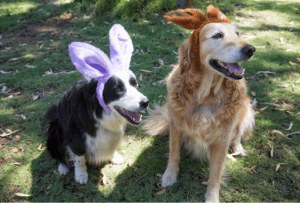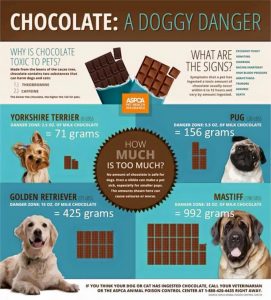Why Is Chocolate Toxic To Dogs?
If you ask most dog owners which foods are toxic to dogs – most will be able to tell you chocolate is among the many human foods that dogs should not eat. Most are aware that chocolate can make dogs very sick indeed and can, in some cases, be fatal. While its common knowledge dogs shouldn’t eat chocolate, there are still plenty of cases of poisoning in vet surgeries every year. Read our Holidays4Dogs article about why chocolate is toxic to dogs and what you can do if your dog accidentally consumes some.
Eastertime and Christmas are such fun and exciting times, especially for children. No doubt we all indulge a little over during these periods. Chocolate and other goodies are all part of the charm of holidays. Don’t forget Valentine’s day too, when some of us may have a few more sweet treats around. However, during these treat heavy times of the year, dogs are more likely to come into contact with these foods which may cause them harm.
Easter in particular sees a surge in cases of dog chocolate poisoning in dogs. Figures released last year, collated by the Kennel Club’s insurance partner, show that insurance claims for chocolate poisoning in during Easter (April) 2022 were 123% higher than at any other time of the year – bar December.
Dogs are ever the opportunists when it comes to food. Therefore, it is important to make sure pets never have access to human chocolate. Chocolate can be highly toxic to our canine pals. To find out why – read on.
What’s in chocolate that makes it so bad for dogs?
Not only does chocolate contain a lot of sugar, fat and caffeine – none of which is good for dogs, anyway – it also contains Theobromine. This is the most toxic component for dogs.
All chocolate is toxic to dogs, whether it is the milk, or white variety. Dark chocolate and chocolate made for baking, are the worst of all.
These contain much higher amounts of Theobromine. Therefore, it is really important to make sure your dog does not have access to any chocolate products meant for human consumption.
For example, if you’re planning an Easter egg hunt this year, it’s probably best not to let your dog join in. With a much more developed sense of smell, your dog is bound to sniff out chocolate far faster than anyone else. Make sure you remember where you stashed all the eggs.
How much chocolate can make a dog ill?
Dogs may not even need to consume large amounts of chocolate to become very ill. Theobromine affects the dog’s heart, guts, kidneys and nervous system. A dog weighing 30kg, for example, could become fatally sick by consuming just 3000mg of Theobromine.
That’s the equivalent of one 500g bar of dark chocolate which could result in serious heart complications.
Symptoms of chocolate poisoning in dogs include:-
Restlessness,
Hyperactivity,
Rapid breathing,
Un-coordinated movement,
Diarrhoea,
Seizures.
What should I do if my dog eats chocolate?
Your dog may require urgent treatment. If you know your dog has consumed chocolate, it is crucial to contact your vet immediately. Provide your vet with your dog’s weight, how much chocolate they’ve eaten and when. If you can, take any packaging along with you. The safest thing to do is ensure chocolate is kept in a sealed container out of the reach of pets altogether.
Dog safe Easter fun!
Dog-safe chocolate is available in stores and online. However, Easter eggs, for example, still look like conventional chocolate eggs – so be careful not to get them muddled up!
is available in stores and online. However, Easter eggs, for example, still look like conventional chocolate eggs – so be careful not to get them muddled up!
Of course, you can also buy doggy chocs from pet stores, which are safe for your pooch as an occasional treat.
Another idea is to fill some scent containers also readily available on-line with some healthy dog treats, like these from Sunday and Dolly’s.
You can also fill with other treats such as mackerel, tuna, low fat cheese, dog friendly peanut butter, or kibble type dog food.
Holidays4dogs.co.uk and 4Dogs are participants in the Amazon Services LLC Associates Program, an affiliate advertising program designed to provide a means for sites to earn commission fees by advertising and linking to the following websites. Read our full disclosure agreement here https://www.holidays4dogs.co.uk/affiliate-disclosure/




